- News
- Reviews
- Bikes
- Accessories
- Accessories - misc
- Computer mounts
- Bags
- Bar ends
- Bike bags & cases
- Bottle cages
- Bottles
- Cameras
- Car racks
- Child seats
- Computers
- Glasses
- GPS units
- Helmets
- Lights - front
- Lights - rear
- Lights - sets
- Locks
- Mirrors
- Mudguards
- Racks
- Pumps & CO2 inflators
- Puncture kits
- Reflectives
- Smart watches
- Stands and racks
- Trailers
- Clothing
- Components
- Bar tape & grips
- Bottom brackets
- Brake & gear cables
- Brake & STI levers
- Brake pads & spares
- Brakes
- Cassettes & freewheels
- Chains
- Chainsets & chainrings
- Derailleurs - front
- Derailleurs - rear
- Forks
- Gear levers & shifters
- Groupsets
- Handlebars & extensions
- Headsets
- Hubs
- Inner tubes
- Pedals
- Quick releases & skewers
- Saddles
- Seatposts
- Stems
- Wheels
- Tyres
- Health, fitness and nutrition
- Tools and workshop
- Miscellaneous
- Tubeless valves
- Buyers Guides
- Features
- Forum
- Recommends
- Podcast
feature
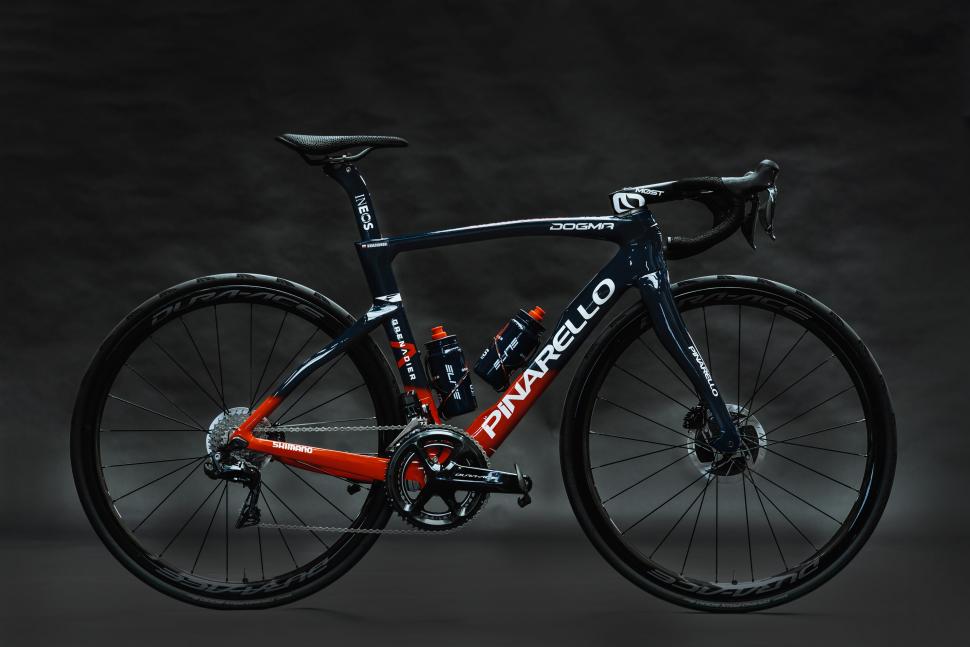 2021 Pinarello Dogma DiskBrake Grenadiers PRBX_03833
2021 Pinarello Dogma DiskBrake Grenadiers PRBX_03833Does the bike industry really want to force you on to disc brakes?
Team Ineos Grenadiers’ announced earlier this week that it is switching from rim brakes to disc brakes, the final UCI WorldTeam to do so; have the pros made the change as part of a cynical ploy by the bike industry to get more money out of you?
Why do we ask that question? If you look on social media you’ll see accusations that the bike industry is promoting disc brakes on road bikes simply to increase profits and that forcing pro teams to use discs is all part of the plan. This is an idea that has been rolling along for years and doesn’t seem to go away, so we thought we’d do some fact-checking. We’re not going to go into technology or performance here, but into what’s driving the market.
Of course, there are those who’d have you believe that road.cc and the rest of the cycling media is in on this disc-brake conspiracy too. If that’s you, you might as well stop reading because, well, what's the point if everything here could be a tissue of lies?
First off, are disc brakes being forced on a reluctant pro peloton? There was certainly some opposition in the early days with several riders claiming that injuries had been caused by rotors back in 2016, and Chris Froome provoked headlines much more recently when he said, “I don't think the technology is quite where it needs to be.”
It’s hard to judge pro riders’ opinions because they usually talk positively about sponsors’ products for obvious reasons, but we’re certainly not hearing as many doubts expressed about disc brakes as we once did. Either most pros are now cool with them or the sponsors have managed to convince them to stay shtum.
Top-level pro teams started shifting over to disc brakes five years ago, so what has prompted Ineos Grenadiers finally to make the shift now?
“We are always looking at ways to improve our kit, technology and bike setup to ensure the riders have the very best options that are available,” said Carsten Jeppesen, Ineos Grenadiers’ Head of Technical Partners.
“Our relationship with Pinarello has always been grounded in a love of racing and innovation, and their work on the Dogma F Disc should enable our riders to race to their maximum.
“Working closely with Pinarello and Shimano, we will continue to develop the all-round disc package, optimising weight, the integration across Dura-Ace, and improvements in the quick release system.”
Let’s be honest, that’s a pretty vanilla statement that doesn’t explain much.
The more cynical might say that until the Dogma F Disc was launched earlier this year, Ineos couldn’t get a disc brake Dogma to an acceptably low weight, so it was forced to stick with slightly lighter rim brakes.
The Dogma F Disc frame kit (including seatpost, headset, fork, and Talon cockpit) is said to be 265g (21%) lighter than the disc brake version of the F12, and Pinarello reckons that a size 53, built up with Shimano Dura-Ace Di2 (R9100, not the recently launched R9200 version) and DT Swiss ARC1400 wheels, weighs 6.8kg (no pedals) – 6.8kg being the lowest permissible bike weight for racing.
What about the idea that the bike industry would rather have you using disc brakes rather than rim brakes to make more money out of you? Well, if a brand convinces you that your current bike is out of date and you need to buy a new one they’ll make cash, but do they get more money by persuading you to opt for a disc brake model?
A contact from the British arm of a major global bike brand – who didn’t want to be named for commercial reasons – said, “More money comes in when we sell a disc brake bike than a rim brake bike simply because, if they’re an equivalent spec, the disc brake bike costs more. It’s the same as in the mountain bike world comparing a full-suspension bike with a similarly specced hardtail because the retail price is higher.
“However, on the flip side, a disc brake bike takes longer to build. Routing hydraulic hoses internally, attaching them, bleeding the system… all this means that the assembly time is much longer for a disc brake bike, and we only have so many production lines and man-hours.”
In other words, according to our source, it's not as black and white as you might think because a manufacturer can assemble fewer disc brake bikes in a given amount of time.
Wilier’s Kevin Izzard makes a similar point.
“In terms of manufacture, there are no advantages to the factory in building disc brake bikes,” he said. “Disc brakes with hydraulic hoses and the requirement for bleeding etc are far more difficult and time-consuming to instal onto a frame than rim brakes.
“This is especially true with modern fully integrated frame/handlebar designs. Although discs are more expensive than rim brakes, the purchase price is also higher so, together with the extra assembly costs, there are no benefits in terms of profit margin when assembling disc braked bikes as opposed to rim.”
Everyone we’ve spoken to in the bike industry has argued strongly that the shift towards disc brakes has been driven by consumer demand rather than by marketing plans. Of course, you could argue that they would say that, wouldn’t they?
Shimano has just launched new versions of its two top-level road groupsets, Dura-Ace and Ultegra, and although both are Di2 (electronic shift) only, they’re each available with disc brakes and rim brakes.
“If you’re talking about business benefits then it’s about offering a wide customer choice,” said Shimano’s Ben Hillsdon. “The reason for both disc brakes and rim brakes within our product line up is to support current customer demands. We offer bike brands the components to match what they feel is the best bike for their customers’ cycling preferences. Consumers are making choices with their components (eg their brakes) to fit their cycling goals and our product developments reflect that demand.”
That’s the official line – changes to the market are consumer-led, according to Shimano.
Giant says that it could have made the TCR road bike disc-brake only when it redesigned the platform last year but figured there was still enough demand to make a rim brake option viable, especially given that there are fewer models out there from other manufacturers. Specialized’s Tarmac SL7 is now disc brake only, for example, as is the latest Trek Émonda. There are plenty of other examples.
On the other hand, many high-end road bikes are still available in both rim brake and disc brake versions, including the Ineos Grenadiers’ Pinarello Dogma F and the Colnago V3Rs ridden by 2020 and 2021 Tour de France winner Tadej Pogacar and his UAE Team Emirates colleagues, allowing consumers to choose between them directly.
Giant’s David Ward said, “We will continue to offer rim brake bikes as long as the demand is there. If we thought we could sell 10 different rim brake TCR models, that’s what we’d offer, but demand has shifted over the past few years.”
In model year 2020, Giant offered seven rim brake TCRs and two framesets in the UK, and nine disc brake TCRs and two framesets. However, a massive reduction in demand for rim brake bikes meant that it offered only two rim-brake TCRs and one frameset in the 2021 model year. Meanwhile, the number of disc brake TCR models in the range increased to eight complete bikes and one frameset.
The swing will continue for the 2022 model year; there is just one TCR complete bike with rim brakes – the Shimano 105-equipped TCR Advanced 2 at £1,999 – and one rim brake frameset – the TCR Advanced SL at £2,549. The rest of the range is disc brake.
Moving on to the Propel aero road bike, Giant decided to bring only disc brake models into the UK in 2021, even though the Taiwanese brand had a rim brake version available globally, simply because that’s what the market demanded. The fact that Giant has spent a lot of R&D time and money on a rim brake Propel and still doesn’t feel it worth importing into this country probably tells you something significant.
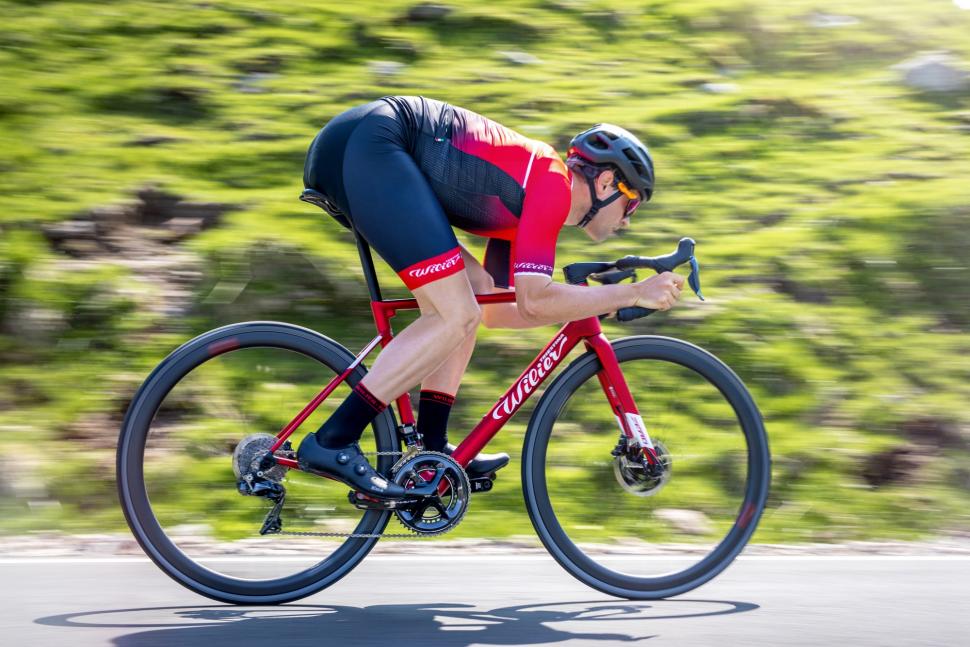 Similarly, when we went to a Wilier bike launch in 2019 the brand’s Claudio Salomoni told us, “We have already designed a Wilier Zero SLR with rim brakes, and started a pre-production version for our internal tests, but it looks like today's customer wants to buy disc brakes so there will probably be no market for the rim version.”
Similarly, when we went to a Wilier bike launch in 2019 the brand’s Claudio Salomoni told us, “We have already designed a Wilier Zero SLR with rim brakes, and started a pre-production version for our internal tests, but it looks like today's customer wants to buy disc brakes so there will probably be no market for the rim version.”
Although the Wilier Zero SLR Rim has been approved by the UCI, it has never come to market and, according to Wilier, isn’t likely to.
“Wilier was initially a somewhat reluctant entrant to the disc brake market, but has developed the new products purely in response to customer demand,” said Kevin Izzard. “In a remarkably short space of time, Wilier saw the market for rim brakes plummet and customers switched to ordering almost exclusively disc brake-equipped bikes.
“Wilier still produces some rim braked bikes, but to give you an example, the Cento 10 NDR is a frame that was designed to be built with either rim or disc brakes on the same frameset. Currently, only around 2% of sales are for the rim braked version, all the others are disc. This split is purely dictated by customer choice.”
Whether disc brakes offer a significant performance benefit on road bikes is a different – although related – discussion that we're not covering here, but our conversations suggest the idea that disc brakes are being forced on a reluctant bike buying public is a complete myth.
Mat has been in cycling media since 1996, on titles including BikeRadar, Total Bike, Total Mountain Bike, What Mountain Bike and Mountain Biking UK, and he has been editor of 220 Triathlon and Cycling Plus. Mat has been road.cc technical editor for over a decade, testing bikes, fettling the latest kit, and trying out the most up-to-the-minute clothing. He has won his category in Ironman UK 70.3 and finished on the podium in both marathons he has run. Mat is a Cambridge graduate who did a post-grad in magazine journalism, and he is a winner of the Cycling Media Award for Specialist Online Writer. Now over 50, he's riding road and gravel bikes most days for fun and fitness rather than training for competitions.
Latest Comments
- Rendel Harris 3 min 47 sec ago
I've put those on Mrs H's bike and keep meaning to put them on mine as well, they are really effective because not only can drivers see you clearly...
- quiff 4 min 42 sec ago
Move the bikes repeatedly - solves the problem, but at your inconvenience. Chop them up - gets the operator's attention and they might do something...
- Doug_D 14 min 47 sec ago
Another book suggestion - I can highly recommend "Lost Summers and Half-Forgotten Afternoons: A Mint Sauce collection" - a beautifully presented...
- chrisonabike 36 min 21 sec ago
Neighbourhood: you can't change anything because we have a disabled resident! Also driving children to schools! People power!...
- chrisonabike 1 hour 27 min ago
But... the last is only not the case with drivers on normal roads because driving on the cycle path / footway / rolling a vehicle up there is seen...
- mdavidford 2 hours 5 min ago
I think you're missing an opportunity to pack even more tech into it - add accelerometers that can detect whether they're pedalling or stepping....
- chrisonabike 2 hours 30 min ago
Thanks. I guess the question is "need". If the road is busy, it sounds like it is a desired route between places? In which case (given this an...
- mdavidford 2 hours 38 min ago
Don't know what you mean. I thought my suggestion was entirely practical.
- Rapha Nadal 3 hours 12 min ago
I'd buy a motorbike fo rthat kind of money!
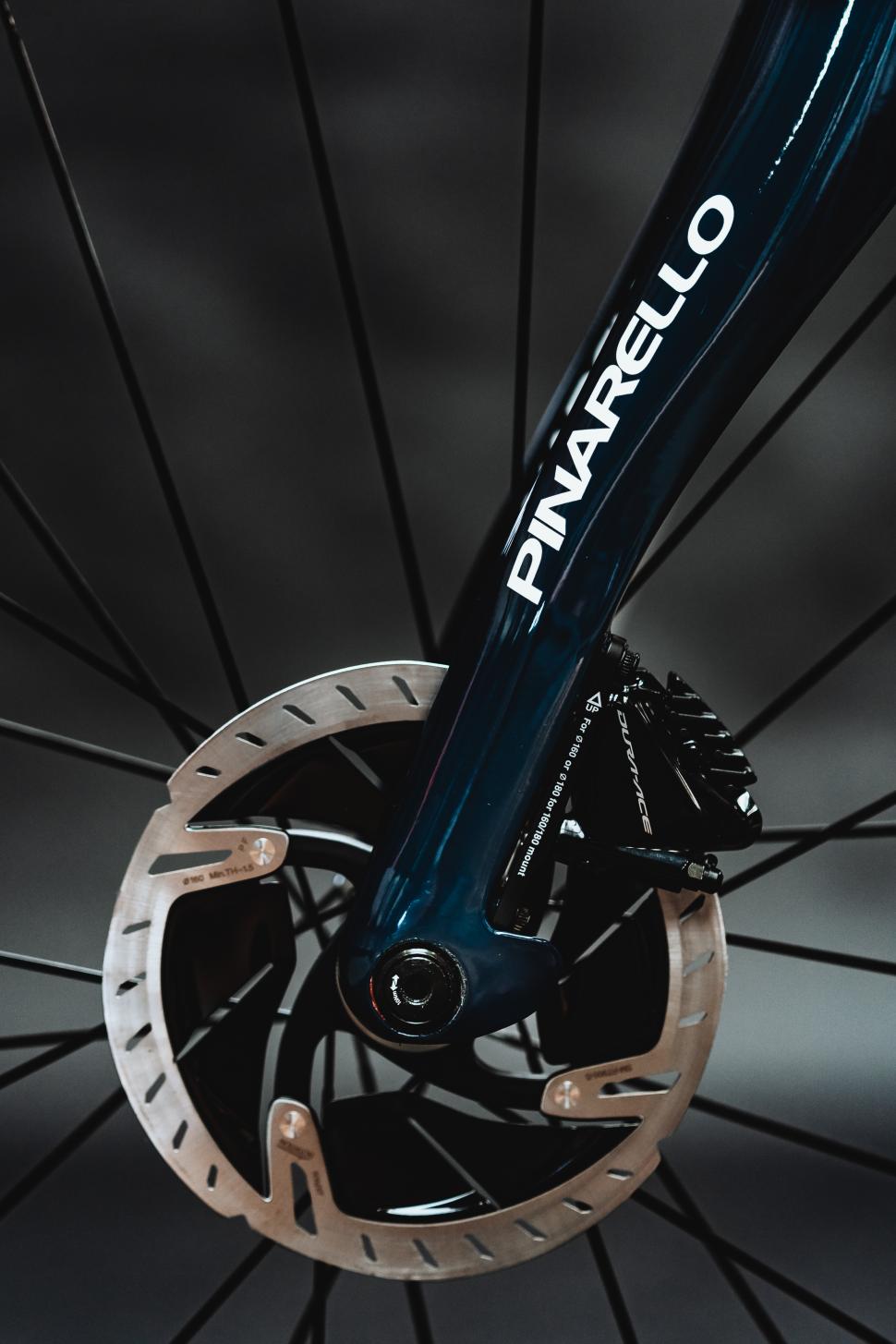
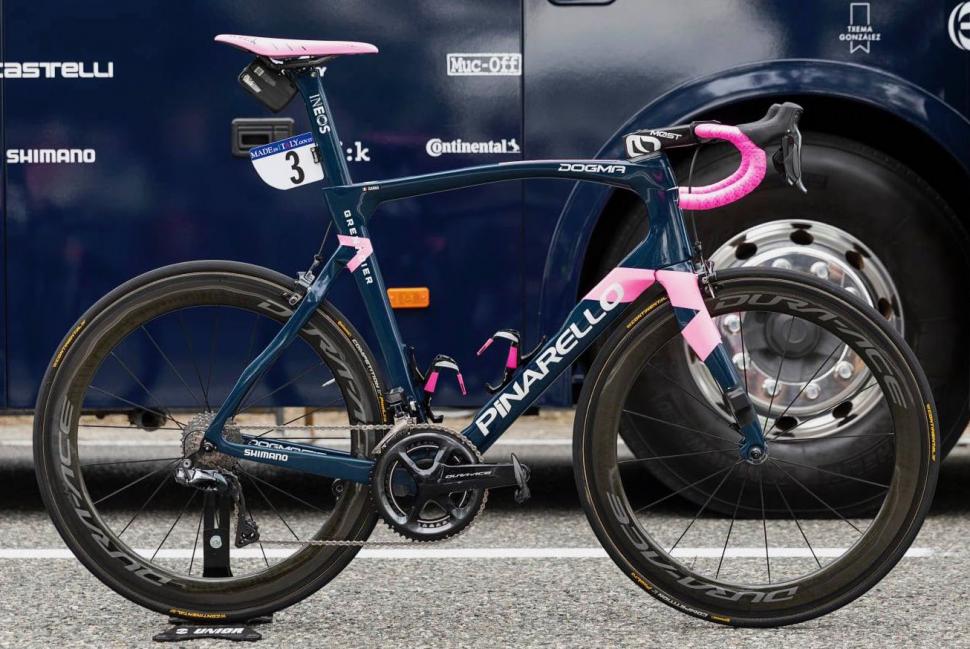

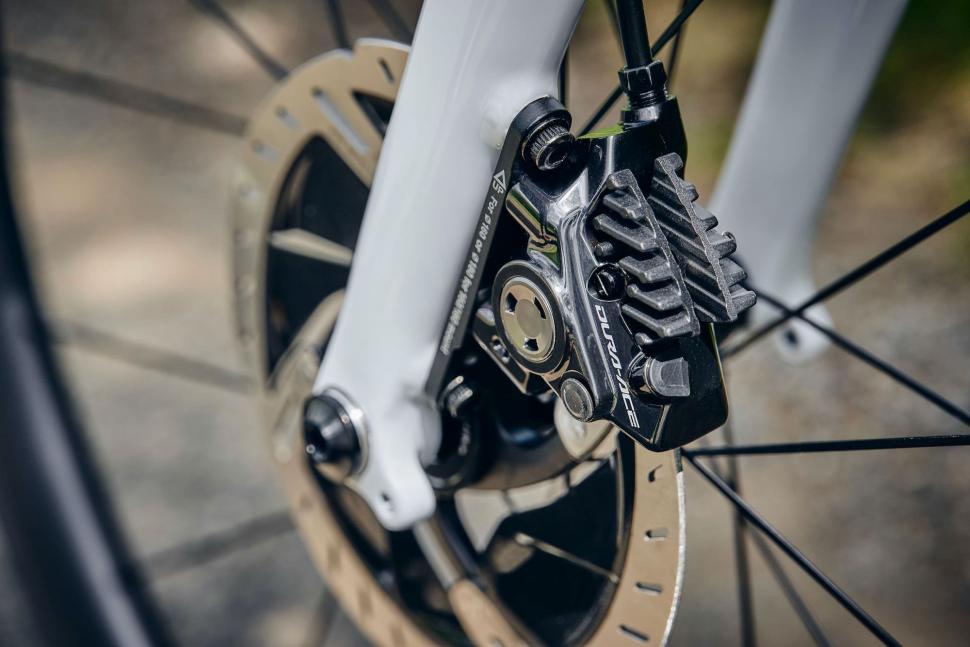
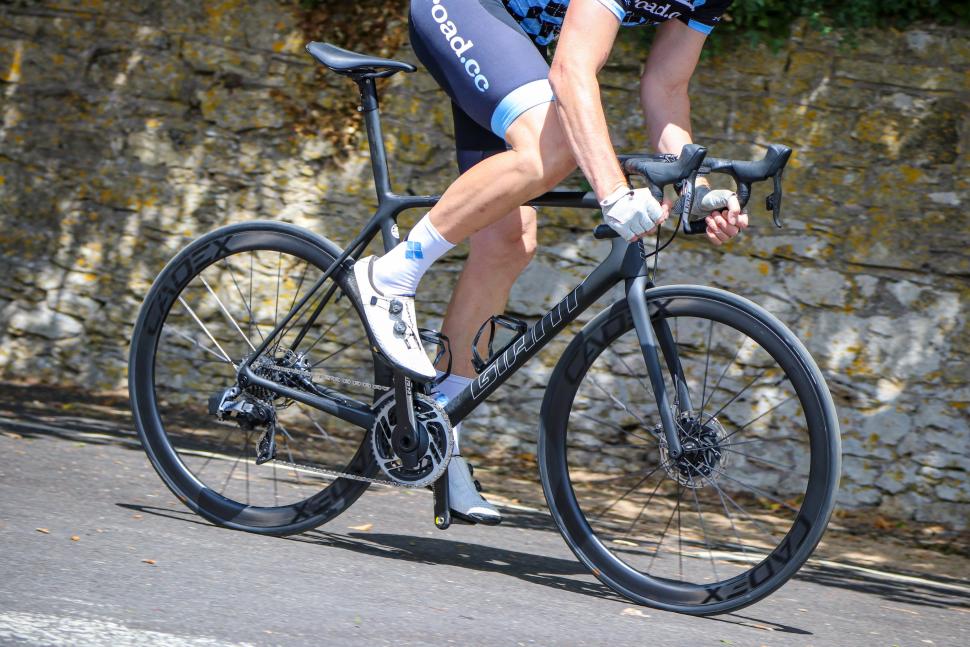
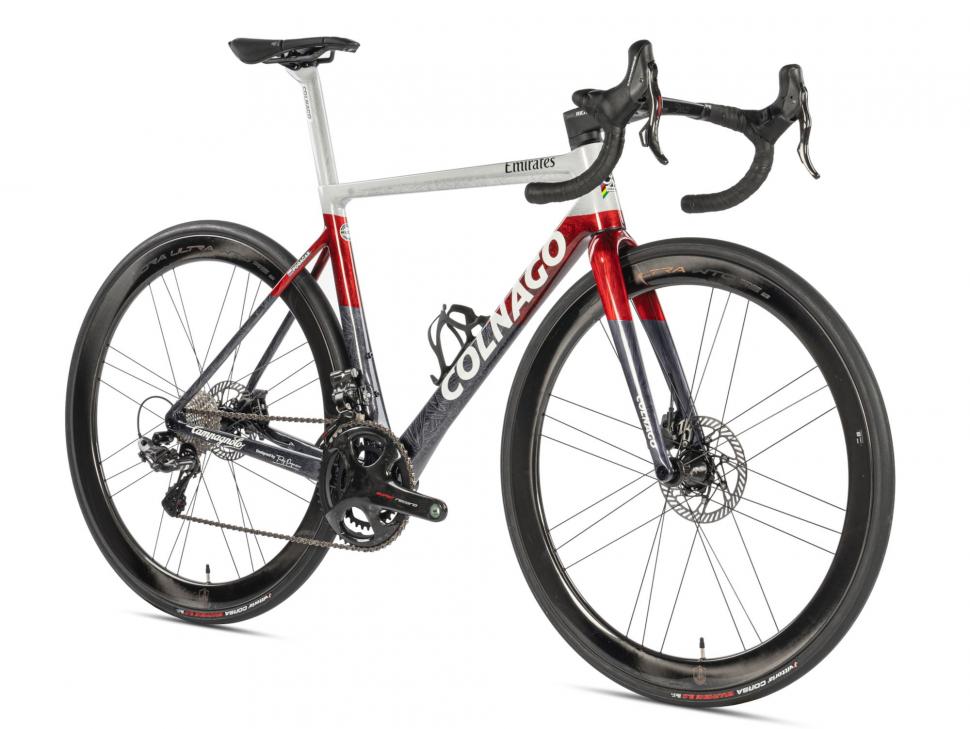
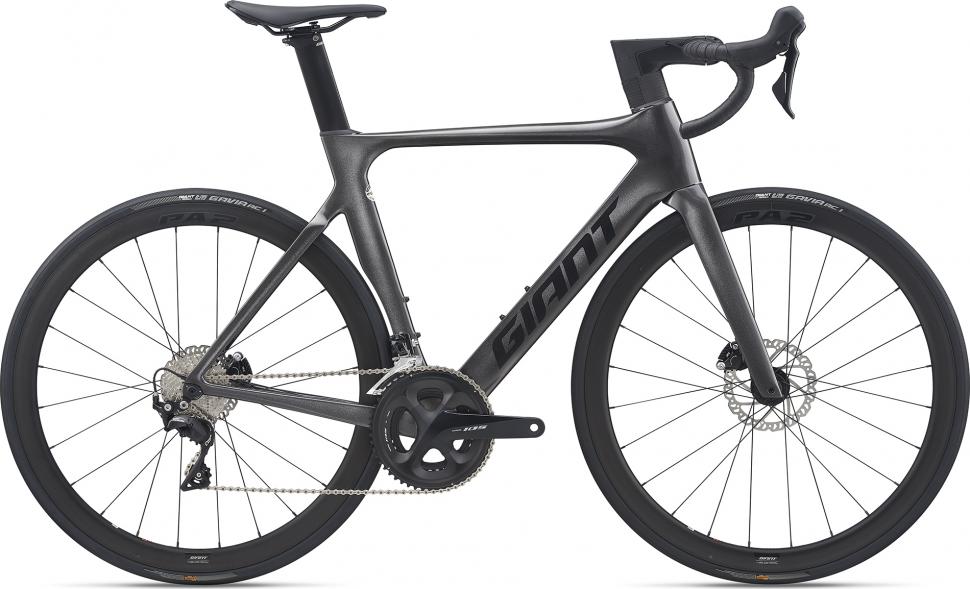
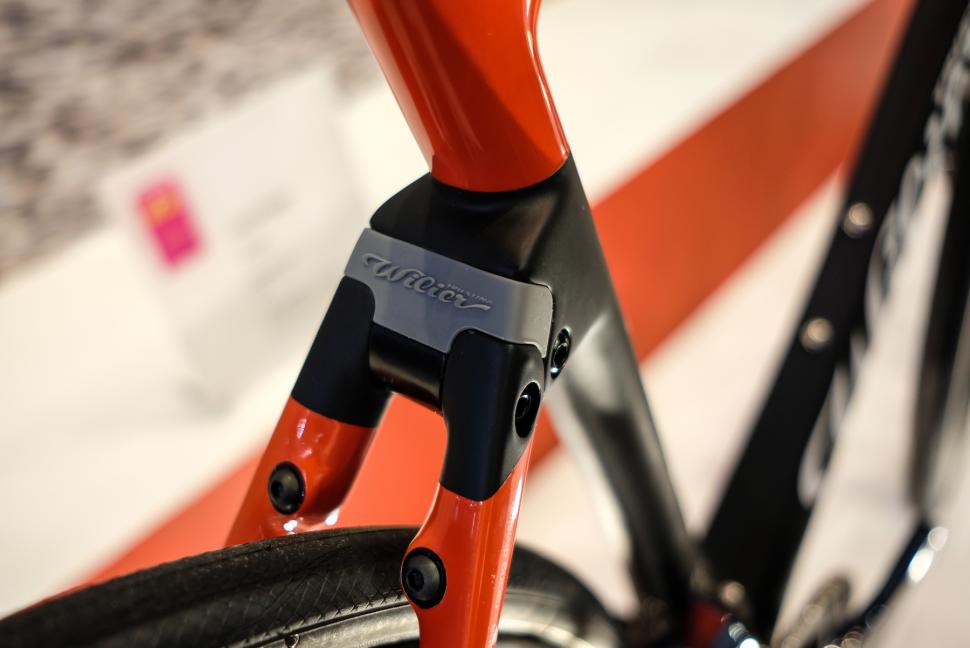
Add new comment
98 comments
The loads on cars and m/bikes are completely different to a bike. You *could* put tubeless and discs on a child's balance bike but nobody would because it's totally unnecessary. That's the point here - are these developments actually needed? If you want them/believe they are that's absolutely fine but I think you're wrong to say that there isn't a valid case for rim brakes for those that are happy with them/don't think disks are needed.
Yupz, the discussion, and the article, is no longer relevant.
What IS i.m.o. relevant, yet almost always forgotten, is the discussion whether the technological/industry advancements are heading in the way we, as a society, want them. Or if we should put legal requirements in place to make sure that adverse side effects are limited.
To take a completely different examples:
Our food chain is controlled by 5-10 big companies. Do we want that?
Five commercial social media companies control a lot of our world view. Do we want that?
More tech-related: do we want more proprietary stuff? Can a tech company just with the flick of a switch render devices useless? What about the right to let things be repaired by third-parties, instead of the manufacturer?
Most of the time society is (too) late to answer these questions.
Of course, technology changes fast and you never how how exactly things pan out. Yet the smallest discussion up front wouldn't be too bad.
That being said, the article is 3-4 years late in trying to start a meaningful discussion on the disc-brake subject. We're past the tipping point.
Cars are not bicycles. My horse has metal shoes on it's hooves, my house has a hot water tank, my aeroplane has propellers. So what?
They're not flat out better under all circumstances, and the advantages of these technologies for cars and motorcycles don't translate to cycling like you think. On cars and motorbikes tubeless is used because tubes don't work at high speeds, and discs are used because they're the ONLY thing that works satisfactorily. When have you last seen a car or a motorbike with rim brakes? None of that applies to bicycles. On a bicycle, rim brakes WORK excellently, they're lighter, simpler, easier to maintain, They work equally well or better than discs in almost every situation except for wet conditions. I have disc brakes on my commuter bike because I'm likely to be riding it in rain or snow. With the road bike I ride in the wet if I'm caught out - and I can deal with that.
Also, thanks for the American arrogance of assuming you're the measure of all things. In Europe manual transmission is not "quaint" or "irrelevant" by any stretch of imagination, seeing how the vast majority of cars have manual gearboxes.
I'm certainly being forced to go disc, very much against my will, there are just fewer and fewer rim brake frames available on the market these days.
If manufacturers could just resolve the issue of squeeling in the wet then I would probably embrace them and just accept the higher cost/heavier bike.
For now though I've got Rourke building me an 853 rim braked gravel bike. Replacing a front rim every 18 months will be worth it for blessed silence! 😎
If it helps, I use Shimano 105 brakes with Shimano resin pads. They don't squeal, wet or dry. Never have.
Thanks, I've spent a fortune trying different brands/pads/rotors, and still have a couple to try, but nothing has worked. I'm beginning to think it's just a weight/frame size/riding style thing.
I haven't tried recent Shimano road callipers but it's a lot of money to invest only to be disappointed! I noticed a LOT of squealing going on during Tour of Britain/Tour of Romania which makes me think it's just unavoidable in certain circumstances!
But the pros will almost certainly be using metallic or sintered pads because they have the strongest stopping power, the downside is they are noisy. Organic pads are much less noisy, I dont think I've heard so much as a squeak out of mine in several years of riding on them, but the trade off is they wear faster and performance isnt optimal
I got about 1200 miles from my front brake pads. But a new pair of Shimano resin pads cost £9, and it was a much easier job than changing brake blocks. Sintered, metallic, ceramic - maybe they give a greater level of performance needed for the professionals, but I'm lacking for nothing on resins.
Totally, it's a marginal gains thing for pros for sure, I've been happy with resin pads, prob got about 2000miles this year on the front and that's worse than normal as it's been wet and the roads are usually full of sand or fine grit near the coast, which totally wrecks rim blocks very quickly.
no one is forcing you to stop using your existing bike.
No, but it's basically a CX frame so I'd like something with a taller headtube and bigger tyre clearance, my 40mm Terreno rear tyre is starting to look pretty scuffed on the sidewalls!
Rim-braked gravel bike... right. Why would anyone do that?
Me, which is why I'm paying upwards of £1000 specifically for the priviledge. And which is why in the summer (and especially in the winter) I'll be plugging away through all terrain and all conditions, squeak and scrape free.
One evening every year (or two) to re-rim a front wheel is a small price to pay.
I own both hydro disk and rim brake bikes.
In the dry (ie when most people ride bikes) the stopping power is the same. Let's just get that straight. Consider your use case before buying a heavy disk bike.
So what you’re saying is, with discs, you can have one bike which has brakes which work well rain or shine, regardless of type of wheel.
That's the sort of thing why people are voting for disc with their wallet.
This is what I find. In the dry my rim brakes on carbon rims are close enough to the disks to not be an issue. In the wet it's a very difefrent story.
Ever gone out for a ride in the dry, only to get caught in an unexpected downpour?
I'm still hapy with rim brakes on my summer bike, but there are hills I would not go down if I got caught in unexpected rain.
It's obvious that you don't live in Glasgow!
No comprendo. Why would you go for a heavy disc bike, when you could have a light one?
Accepting that disc brakes perform better, it's also in the interest of manufacturers to entice riders onto more expensive equipment with higher cost consumables....
With 4 bikes I'm stuck on rims - but as a heavier rider I'd certainly think twice about screaming down an Alp on my carbon rims with rim brakes....
Some very nice looking bikes here, by the way. I have a thing for Giant Propels and Wiliers....
This. I'm 80kg and frankly find riding down steep gradients on my carbon rims unerving in the dry, terrifying in the wet - they simply don't stop well. I live in Essex, so trips to more 'up and down' parts of the country have me swapping to aluminium shallow section rims (which brake amazingly in comparison). If I could afford hydro discs I'd be all over it but I can't. Better for me would be if someone still made modern profile aero wheels with aluminium brake tracks that would be perfect (eg like old Swissside wheels).
hmmm, well I am 78Kgs and do not find riding down steep gradients on carbon rim brakes unnerving, not remotely in the dry and not really in the wet. In fact they perform better than my alloy rim brake wheels. Probably because I use top end wheels and dura ace brakes and the correct brake blocks whereas my alloy wheeled bike has not so good brakes or pads.
"Disc brakes with hydraulic hoses and the requirement for bleeding etc"
Is actually true? I know the retail kits from Shimano come pre-bled and as long as you are careful even a numpty like me can fit them without needing bleeding. Are the OEM ones any different?
You can't install pre-bled retail kits on a bike with internal cable routing, which is pretty much any bike over £1000 these days.
Um. Why not? This numpty managed it for the down tube at least. The way Shimano seal it it was fine.
Currently I've got SRAM Force AXS disc on one bike, Campagnolo Ekar on the gravel bike, and I've got Campagnolo SR EPS with rim brakes on another. The rim brake bike has Bora Ultra 35s, and I can say without ANY doubt that the stopping on it is the best of the bunch, and that's in all weathers - including Biblical rain on Alpine descents. So yeah, discs are nice, but they're just as good as a quality brake/rim match.
*I've used Shimano in the past and it's just meh as far I'm concerned, but that's for another (very tired) debate.
spot on..... I've one disc bike a CX and that is finally matched now rotors and pads....and I'm on the tools.... all this disc thing does is put more cash through the tills for me and other bike traders.....as customers seek the noise free disc brake experience.....can't beat my Campy brakes on my 2 rim brake bikes...
No, I'm not having that; you're making it up. There is no way a rim braked bike will be better on a wet Alpine descent than hydro disc braked bikes.
I agree, I have Bora Ultra 35's and Bora One 50's and both have fantastic stopping power when used with my Dura Ace brakes and decent brake blocks. I also have a set of Caden Carbon Superlight wheels and they also perform just as well.
I for one am sick and tired of the Disc-lobby's machinations. I'm a hard-pressed v-braker, and this is just another stealth tax. This isn't what I voted Brexit for! It's political correctness GAWN MAIRD!
Pages